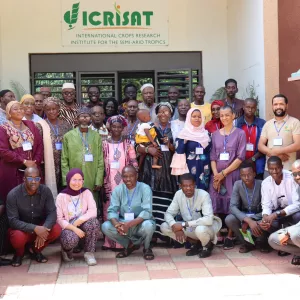CGIAR program focusses on a more inclusive and sustainable small ruminant value chain in Mali
The CGIAR Sustainable Animal and Aquatic Foods (SAAF) program is advancing gender inclusivity, scientific innovation, and local partnerships including with Mali’s Institut d’Economie Rurale (IER) to strengthen the country’s small ruminant value chain. Launched in Bamako in June 2025, the five-year program is coordinated by the International Livestock Research Institute (ILRI) in collaboration with IER, the International Center for Agricultural

CGIAR program focusses on a more inclusive and sustainable small ruminant value chain in Mali
The CGIAR Sustainable Animal and Aquatic Foods (SAAF) program is advancing gender inclusivity, scientific innovation, and local partnerships including with Mali’s Institut d’Economie Rurale (IER) to strengthen the country’s small ruminant value chain. Launched in Bamako in June 2025, the five-year program is coordinated by the International Livestock Research Institute (ILRI) in collaboration with IER, the International Center for Agricultural Research in the Dry Areas (ICARDA), and the Alliance of Bioversity International and CIAT (ABC).

SAAF will build on the achievements of the 2022–2024 Sustainable Animal Productivity (SAPLING) initiative, whose projects focused on animal health, genetic improvement, nutrition and economic inclusion for women. Under SAAF, these efforts are being scaled through locally driven innovations such as thermotolerant vaccines, community breeding programs, climate-smart feeds, and digital advisory tools. Active in 17 countries, including Mali, the program brings a global yet locally grounded approach to transforming animal and aquatic food systems.
About 40 stakeholders from the small ruminant value chain in Mali gathered at the International Crops Research Institute for the Semi-Arid Tropics (ICRISAT) campus in Bamako for the SAAF launch workshop on 2nd and 3rd June. Representatives from the Ministry of Livestock, the private sector, farmer cooperatives, veterinary groups, NGOs, meat and milk processors, donors and the World Organisation for Animal Health (OIE), discussed the:
- ambitions of the SAAF program;
- update to the theory of change for the small ruminant value chain developed during the implementation of SAPLING, and
- strategic priorities and collaboration modalities for SAAF in coming years.
Doubangolo Coulibaly, representing the director general of the Institut d’Economie Rurale (IER), emphasized the crucial role of livestock farming in Mali’s rural economy.
‘Livestock farming makes a substantial contribution to the income of 80% of rural households, and accounts for over 40% of agricultural GDP. The production of small ruminants is essential, especially for rural women,’ said Coulibaly.
He also stressed the importance of a more efficient, inclusive and equitable value chain, in terms of sustainability, productivity, income generation and food security.
Scaling up change
The SAPLING initiative was implemented by ILRI, ICARDA and ABC in the Ségou and Sikasso regions of Mali. Through integrated innovation packages, it enabled small-scale livestock farmers, particularly women and young people, to enter inclusive value chains and increase their productivity by 30-50%. These results were achieved through the creation of local multi-stakeholder platforms, fostering links between producers, service providers, markets and financial institutions.
Project coordinator Michel Dione says SAAF offers new opportunities to demonstrate system integration in tackling location-specific challenges: ‘SAAF will improve access to more nutritious food, reduce greenhouse gas emissions from livestock systems and create resilient and inclusive livelihoods. It gives us the opportunity to go further in structuring the small ruminant sector in Mali, with an approach centred on the needs of livestock farmers, the development of local knowledge and the inclusion of the most vulnerable.’
Collective review of priorities
The first day of the workshop assessed the impact of SAPLING, including several innovations adopted by the community platforms. Of particular interest were:
- the improvement of animal health through the vaccination of small ruminants using a thermotolerant vaccine against peste des petits ruminants;
- the production of fodder adapted to the local climate;
- the creation of community genetic improvement programs; and
- the revitalization of livestock farmers’ cooperatives, in particular women’s cooperatives.
The second day comprised a participatory update of the theory of change for the small ruminant sector in Mali. The participants identified several persistent challenges, including:
- lack of access to veterinary services;
- low value addition for the products of women livestock farmers;
- disorganized and untraceable marketing chains;
- poor knowledge of the genetic potential of small ruminants;
- ineffective feeding strategies for animals; and
- limited adoption of innovations.
The discussions led to a shared vision of a modernized industry, in which:
- multi-stakeholder platforms will play a central role in coordinating action;
- the One Health approach will be integrated for disease prevention;
- milk and meat processing chains will be structured to create more local value; and
- digital technology will mobilize real-time market intelligence, financial access and community driven innovation.
Women farmers from Sikasso and Ségou called for greater support in terms of training, access to finance and recognition of their economic role. Greater inclusion of women in the value chain will therefore be a particular priority under the new program.

At the end of the workshop, the partners validated a joint roadmap and identified priority areas of intervention for the first few years of SAAF. These include support for small-scale processing of animal products, support for cooperatives run by women and the formalization of marketing channels.
The workshop was organized by ILRI in partnership with IER, the Direction Nationale des Services Vétérinaires (DNSV), the Centre National d’Insémination Artificielle (CNIA) and the Laboratoire Central Vétérinaire (LCV).

